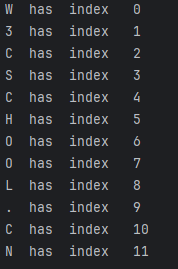
Java 字符串字符
Java数据类型教程 - Java字符串字符
索引字符
您可以使用charAt()方法从String对象中获取特定索引处的字符。索引从零开始。
下面的代码打印索引值和字符在“W3CSCHOOL.CN"字符串中的每个索引处:
public class Main {
public static void main(String[] args) {
String str = "W3CSCHOOL.CN";
// Get the length of string
int len = str.length();
// Loop through all characters and print their indexes
for (int i = 0; i < len; i++) {
System.out.println(str.charAt(i) + " has index " + i);
}
}
}
上面的代码生成以下结果。

测试字符串是否为空
测试String对象是否为空。空字符串的长度为零。
有三种方法可以检查空字符串:
- isEmpty()方法。
- equals()方法。
- 获取字符串的长度,并检查它是否为零。
以下代码显示如何使用三种方法:
public class Main {
public static void main(String[] args) {
String str1 = "Hello";
String str2 = "";
// Using the isEmpty() method
boolean empty1 = str1.isEmpty(); // Assigns false to empty1
boolean empty2 = str2.isEmpty(); // Assigns true to empty1
// Using the equals() method
boolean empty3 = "".equals(str1); // Assigns false to empty3
boolean empty4 = "".equals(str2); // Assigns true to empty4
// Comparing length of the string with 0
boolean empty5 = str1.length() == 0; // Assigns false to empty5
boolean empty6 = str2.length() == 0; // Assigns true to empty6
}
}
更改案例
要将字符串的内容转换为小写和大写,请分别使用toLowerCase()和toUpperCase()方法。
String str1 = new String("Hello"); // str1 contains "Hello"
String str2 = str1.toUpperCase(); // str2 contains "HELLO"
String str3 = str1.toLowerCase(); // str3 contains "hello"